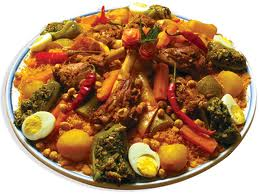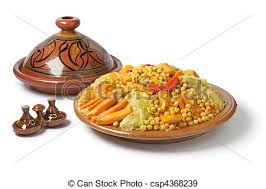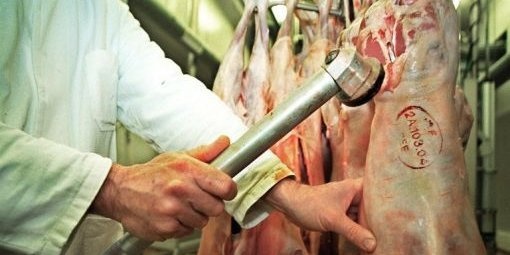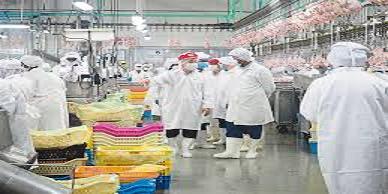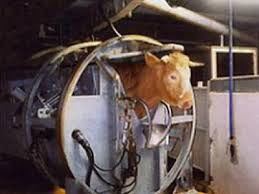Most people are aware that Muslims have certain dietary restrictions, but they are not quite sure what they are. Most know that the consumption of pork and alcohol are prohibited, but beyond that little else is known to the general populace. When beginning to explore Muslim dietary laws one should not begin with the restrictions, but later, what is permitted to the faithful, for that by far outweighs the restrictions.
In the Qur’an it states:
“Oh mankind! Eat of what is permissible and good on the earth, and do not follow in the footsteps of satan; truly; he is an open adversary to you.” (2:168)
God’s intention is not to deprive Muslims of food or to limit their nutrition. On the contrary, God’s laws regarding food restrictions is to insure that Muslims consume what is good and not what is harmful. Food can be divided into several categories, halal, that which is permitted to eat, haram, that which is forbidden to eat, makrooh, that which is doubtful and mash-booh, that which is suspect. Halal, that which is permitted, is good for us and we should partake of halal foods. The milk group is a halal group of foods. Milk, cheese, yogurt and butter can all be eaten. Fruits and vegetables are also considered halal unless they are known to be poisonous.
Vegetables may be pickled in brine or vinegar, but it cannot be fermented as ft gives an alcohol content to the food and this is not permitted. Cereals axe also considered halal. All grains and bread products are considered – edible. The meat group falls into two categories, halal and haram depending on the type of meat and how it was handled. Amongst the halal or permitted meats are fish and anything taken from the sea, unless it is poisonous. The only land animal mentioned specifically by name to be prohibited is the pig.
The Qur’an states:
“Oh you who believe! Eat of the good things that we have provided for you, and be thankful to Allah if it is he alone you worship. Indeed, what He has forbidden to you is the flesh of dead animals and blood and the flesh of swine, and that, which has been sacrificed to anyone other than Allah. But if one is compelled by necessity, neither craving nor transgressing, there is no sin on him; indeed, Allah is Forgiving, Merciful”.
Pork is forbidden for numerous reasons, most of them health related. It has been found microbial evidence that there are a number of parasites and bacteria that live in swine flesh that when eaten can transmit disease to people. Among them are round worms, tape worms, hook worms, fasciolopsis buskin, paragonimus, clonoclus senesis and erysipelthix rhnsiplathius. Some of the diseases that these parasites may cause are dysentery, trichinosis, jaundice, pneumonia, intestinal obstruction, acute pancreatitis, enlargement of the liver, emaciation, typhoid, high fevers, retarded growth development in children, spontaneous abortion and sterility. This is reason enough not to eat an unclean animal, however,
“Since the pig relishes filth and offal, its meat is repugnant to persons of decent taste.”
Although swine are the only animal mentioned specifically in the Qur’an that is forbidden to eat, there are other meats that are considered haram as well. Among these are animals that were not slaughtered correctly. Animals that have been killed in the following way may not be eaten by Muslims:
1. Strangulation – Any animal that has been killed by garroting or by suffocation my not be consumed.
2. Falling – Any animal that dies as a result of a fall into a gully or ravine may not be eaten.
3. Beating – Any animal that has been beaten to death by a blunt instrument may not be consumed.
4. Found Dead – Any animal already found dead may not be eaten.
The latter restriction stems from common sense. If a dead animal is found it may have died from disease. If the disease killed the animal, then the disease was harmful and it still may be in the flesh of the dead animal. Therefore, to partake of it one might harm themselves and this is clearly not advisable so it is better to leave this meat uneaten. Other reasons not to eat an animal already found dead include that by observing this prohibition the carrion left behind will be providing food to other wild animals and birds. This prohibition helps to encourage the owner of the animal to care for him and keep him well nourished or to slaughter it mercifully if needed for food. And finally, the eating of carrion is repugnant to civilized people. The other laws stem from God’s concern for animals as living creatures. It is God’s wish that we care for what he provides to us. If he provides us with cattle, sheep or goats we have certainly not cared for them well if they have died by falling into a ravine or by having been gored to death by another animal.
Additionally, we have not been kind to any animal if when we need it for food we kill it by strangling it or beating it to death. Not mentioned in the Qur’an is the killing of animals by electric shock. This practice of killing animals has become popular with today’s meat packing industry, as it is an efficient method for the worker to use. Yet, Muslims disdain this method because it is painful to the animal and because this method of killing does not allow blood to drain from the carcass and it coagulates inside instead. This taints the meat.
The correct way to slaughter an animal is to say the name of God aloud and to face Mecca when performing the act. The animal should not be hungry or thirsty at the time and the knife should not be sharpened in front of the animal. This is to not cause undue stress to the animal and to show respect to another one of God’s creatures. The slaughter must also be done by a Muslim.
When done the knife should be stuck in the hollow of the neck or by the cutting of the throat. This is the quickest way of death with the least amount of pain to the animal. Additionally, the animal should continue to be treated with respect after it dies. Its neck should not be broken and it should not be skinned or cut open until the carcass is allowed to cool. The blood must be completely drained from the carcass and the carcass should also be washed with clean water.
Meat sacrificed it idols is forbidden, but meat slaughtered by Jews and Christians is permitted if done humanely. As one cannot be sure how the meat in large supermarkets has been processed, many Muslims still prefer to shop at local butchers where meat has been slaughtered according to religious practice.
Alcohol and drugs for recreational and not medical purposes are considered forbidden, or haram. In the Qur’an it states:
“You who believe! Intoxicants and gambling, idols and raffles are only a filthy work of satan, turn aside from them so that you may prosper. Satan only wants to stir up enmity and jealousy among you by means of intoxicants and gambling, and to hinder you from remembering God, and from praying; so will you not abstain?”(5: 90 – 91)
Much has been written about how alcoholism and drug abuse as of late. One need not look far to see what alcohol and drug abuse have done to the individual and to society. One need only go to a daily newspaper or to watch the nightly news to see how these drugs affect today’s society. Additionally, alcohol causes ulcers, stomach cancer, liver ailments and digestive and neurological disorders.
As Muslims strive to consume what is good and abstain from what is harmful, alcohol and non-medical drug consumption is prohibited. Additionally, money spent on these items is wasted because it is not spent on wholesome food and a person who is intoxicated and does not act in his right mind cannot be respected.
Abbdullah ibn Umar, a son of the second caliph of Islam reported that the Prophet Muhammad “Alcoholic beverages are the mother of abomination and filth.” The Prophet
said that, “liquor is the mother of many evils; and it is the most shameful of evils; anyone who drinks liquor will neglect prayer, and many will commit incestuous offenses.”
While it is not our intention to spell out all the physical perils of liquor and drug addiction, as there are a host of books published on each subject, we would like to stress how much alcohol is hated in the Muslim community. It is considered an evil to be avoided at all costs.
Reasons to be amongst that Muslims shun the consumption of alcohol :
Alcohol is considered to be an abomination.
Alcohol is Part of Satan’s handiwork.
Drinking alcohol generates enmity and hatred among people.
Alcohol prevents people from remembering God.
Alcohol prevents and/or delays Muslims from performing their daily prayers. Even if they pray they will not understand the meaning and significance of what they are doing and saying.
Those who drink will be denied paradise.
Those who drink alcohol are considered by Islam to be similar to those who worship idols, which is totally prohibited in Islam.
When a person drinks alcohol he is not considered to be a believer.
Alcohol is the mother of all evils in society.
Muslims believe that the prophets of God did not taste alcoholic beverages and that alcohol was prohibited in the original scriptures of divinely revealed religions.
Alcoholic beverages have some benefits, but sin and harm resulting from their consumption are far greater than their benefits.
Alcohol brings God’s (Allah’s) curse down on those who drink it, as well as those who plant or cultivate its raw materials, produce, sell or deal with it, and those who participate in drinking parties.
Alcohol is responsible for a large number of road accidents.
Alcohol is the cause of many broken families.
Under the influence of alcohol, more homicide, rape and other offenses are committed.
Alcohol in any form is considered wrong and should be avoided, even in medicine. It was said that once the wife of the Prophet Muhammad , Umm Salama gave heir daughter some wine when she fell ill.
The Prophet became furious with her and told her that God did not create illness so that Muslims could cure themselves with what is haram.
In today’s world, many over-the-counter flu and cold remedies contain alcohol in their ingredients. One must be careful to read the label of such products to make sure that what they are purchasing is not Haram, for using such a product would be just as forbidden as the consumption of alcohol itself for medicinal purposes, i.e. hot toddy.
As alcohol does not cure an ill it should not be used to mask or deaden the pain of an illness. The only exception to this that might be made is when all of the following conditions are met:
1. The Patient’s life is endangered if he does not take the medication.
2. No alternative medication made from entirely halal sources is available
3. The medication is prescribed by a Muslim physician who is knowledgeable as well as God fearing.”
Up to this point halal, that which is permitted and haram that which is not permitted has been discussed, yet, the terms makrooh and mash-booh have not been examine. Makrooh is an Arabic word that means discouraged. Food that falls into this category is permitted because it has not been specifically designated as haram, but the food is not clearly beneficial either so it cannot be considered halal. A person who partakes of makrooh substances may be blamed for it on the day of judgement, but they may not be penalized for its consumption. A person should therefore strive to abstain from food or sustenance that are considered Makrooh as well as what has already been described as haram. Examples of makrooh items are: coffee, teas and any soft-drinks containing caffeine, stimulants, depressants. All these substances can cause dependency and are not recommended for ” reason. Tobacco is also not recommended for the same reason. Garlic and onions are considered makrooh on Friday because they may cause bad breath. Since Friday is the day of Juma, or congregational prayer, food substances that might cause bad breath should be avoided on this day as not to offend others during prayer.
Mash-booh is an Arabic word that means suspected. Items considered suspected when a person does not know if they are halal or haram. Each person must try their best to make a decision about such a food product. A good Muslim avoids things that are considered mash-booh.
In the past, it was easier for Muslims to distinguish between haram and halal foods and there were very few foods that fell into the makrooh or mash-booh categories. This is because food was made with natural products that were easily identified. Today, especially in the western countries this is not the case. Take a package of bread and read the ingredients listed and try to figure out what they all are. Many other canned, frozen and microwaveable products contain dozens of preservatives. Therefore, it is necessary for Muslims to read food ingredient labels closely as many of today’s food products should be considered mash-booh, or suspect until one is sure that all the ingredients inside are halal.
If one pays attention to what is written on product labels, one can better decide if the food product should be considered halal or haram. Items mentioned on a label that should be considered to make the product haram are: cholesterol, as it is a type of fat always of animal origin and one cannot be sure that the animal was not a pig or if it was other meat, if it was slaughtered correctly. Shortening for the same reason, unless it states that vegetable shortening is 100% pure, other wise vegetable shortenings may contain up to 10% animal fat. Lard is always haram because it comes from pigs. Gelatin (Jello) is Haram as it is made from animal, mainly pork products. Pepsin is forbidden because it is made from the gastric juices of pig’s stomachs. One should be careful, as pepsin is usually not labeled as an animal product. Rennen, sometimes called rennet, is considered haram for the same reason. It is a product usually used in cheese for curdling the milk.
Substances that should be considered makrooh, or discouraged are: artificial sweeteners, cyclamates, saccharine and aspartame; as they have nor caloric value. Coloring additives are also discouraged for the same reason. Caffeine is makrooh because it is a stimulant and has addictive qualities. Diuretics should be considered makrooh, unless they are used for strictly medicinal purposes. Nitrates, sometimes called nitrites, that are used as preservatives are discouraged as is phosphoric acid, a product used in soft drinks is known to cause tooth decay. Other than reading the labels of food products for ingredients, Muslims should also check the expiration date on the label to make sure it is fresh.
Sakr encourage Muslims to practice the following alternatives to insure that their diet remains halal :
Include vegetables in every meal.
Use fruits as deserts instead of cakes or pies.
Use fresh juices instead of preserved ones. Fresh juices are better than soft drinks.
Use herbal teas instead of coffee and tea.
Fresh foods are better than frozen foods. Frozen foods are better than canned foods. Finally, canned foods are better than dried foods.
Freeze dried foods are high quality foods.
Use raw vegetable oils instead of fats or hydrogenated vegetable oils.
S. Pressure cooking method is better than normal cooking.
The use of the microwave oven is nutritionally a very good method.
Look for spring water, mountain natural water, and even hard water instead of soft water.
Whenever possible, uses honey instead of sugar and use brown instead of white sugar.
Use whole cereal grains instead of refined ones.
Use brown breads instead of white.
Use whole flour instead of bleached.
Use brown rice instead of polished (white) rice.
Look for “Zabiha” meat and Zabiha products in all foods.
Use plant jello and pectin and not animal ones.
Use microbial yeast instead of brewer’s yeast.
Look for microbial renin or rennet or plant enzymes instead of animal ones.
Look for natural flavorings, colorings and preservatives instead of synthetic ones.
If people are still in doubt about what is in a food product they should write the food industries and ask.
People should also check references and talk to specialists about these food products before jumping to conclusions about judging a food product as Halal or Harem if they are not sure.
And finally, they should lobby the food industry about their dietary concerns on products so that the food companies can be aware of consumer demand. If Muslims pay attention to the type of food that they put into their bodies, they will insure that they lead healthy fives.

